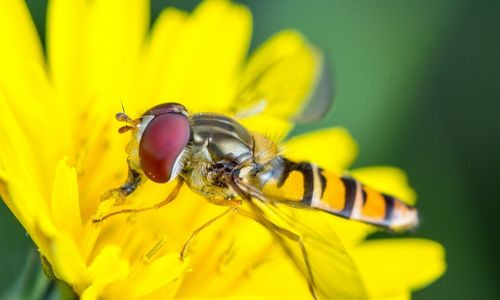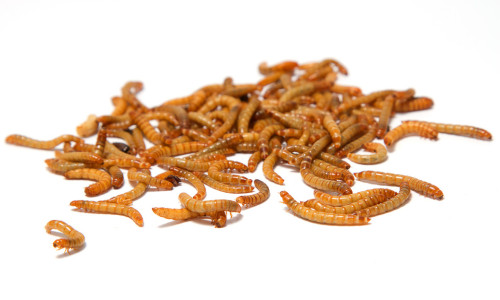Flies. The very word might conjure images of buzzing pests, landing uninvited on food, and generally being a nuisance. It’s easy to be annoyed when one of these insects decides to investigate your picnic or home. You might even have heard the unsettling fact that flies can vomit on your food. And yes, it’s also true they aren’t the most hygienic creatures. However, before you reach for the fly swatter, consider this: flies play surprisingly crucial roles in our ecosystems and even in our lives.
While there are thousands of fly species across the globe, from hoverflies (nature’s mimics, resembling bees) to blowflies and bee-flies, and the ever-present house fly, their existence isn’t accidental. Let’s delve into understanding the purpose of flies, exploring four key reasons why they are essential to our planet and the unexpected benefits they bring.
Flies: Nature’s Unsung Pollinators
Bees often get all the credit for pollination, flitting from flower to flower, diligently collecting pollen. Flies, on the other hand, are less celebrated in this role. Yet, they are incredibly effective pollinators. Unlike bees which carefully store pollen, flies are more casual distributors. As they move from blossom to blossom, pollen clings to their hairy bodies and is readily transferred, a vital process for plant reproduction. Consider your morning coffee, the peppermint oil soothing your headaches, or the sesame dressing on your salad – flies have likely played a part in pollinating the plants that produce these items.
 Hoverfly pollinating a flower, illustrating the vital role flies play in plant reproduction
Hoverfly pollinating a flower, illustrating the vital role flies play in plant reproduction
Here’s how flies contribute significantly to pollination:
- It’s estimated that flies contribute to pollinating at least 70% of the world’s food crops.
- Flies are primary pollinators for numerous cultivated plants, including vital crops like cacao (for chocolate!), mangoes, cashews, avocados, and oilseed rape.
- Commercially, flies are already employed to pollinate crops such as blackberries, carrots, chives, onions, and strawberries.
- With increasing global food demands, flies may become even more crucial for food security as we need to diversify our managed pollinators beyond just honeybees.
- Flies are essential for pollinating hops used in beer, apples for cider, and grapes for wine – adding a hidden layer of appreciation to your favorite beverages.
Fly Advantages: Outperforming Bees in Unexpected Ways
Flies possess several advantages over bees, making them indispensable pollinators, especially in specific environments:
- Altitude Acrobats: Flies aren’t deterred by heights. In high-altitude climates where bees are scarce, flies become the dominant pollinators.
- Widespread Wanderers: Flies are less tied to their offspring than bees. They lay eggs and move on, allowing them to cover larger distances, collecting and scattering pollen over a wider area as they travel from flower to flower.
- Sting-Free Service: Unlike bees, flies don’t sting, making them harmless pollinators.
- Weather Warriors: Flies are less sensitive to temperature fluctuations and are active earlier and later in the day, and even in cooler conditions when bees prefer to stay in their hives.
- Rain or Shine Pollinators: Flies are active even in wet and windy weather, conditions that would ground bees.
- Rapid Reproduction: Flies breed rapidly, with a life cycle of about a month and females laying up to 500 eggs. Their short, productive lifespans contribute significantly to pollination.
- Migratory Masses: Some hoverfly species migrate in large numbers, suddenly appearing and outnumbering honeybees during critical pollination periods.
- Hairy Pollen Carriers: Blowflies, for instance, are remarkably hairy and can carry more pollen than a honeybee due to their dense body hair.
Flies in Medicine: Healing Wounds with Maggots
Beyond pollination, flies have a surprising and beneficial role in medicine, specifically through maggot therapy. Medical-grade fly larvae, essentially “maggot nurses,” are used to treat chronic, infected wounds. These live larvae are carefully introduced to wounds where they consume dead skin tissue, effectively cleaning the area.
 Medical maggot therapy showing nurse applying larvae to wound, highlighting flies' use in medicine
Medical maggot therapy showing nurse applying larvae to wound, highlighting flies' use in medicine
Maggot therapy is used for various types of wounds, including diabetic ulcers and bedsores. The maggots not only remove necrotic tissue but also secrete antibacterial saliva, which further cleanses the wound and promotes the growth of healthy new tissue. Once their work is done, the maggots, full of dead tissue and bacteria, are easily removed, leaving behind a cleaner wound ready to heal.
Flies as Nature’s Sanitation Workers: Consuming Rotting Matter
Perhaps one of the less glamorous but most vital purposes of flies is their role as scavengers. Flies are not picky eaters; they consume a vast array of organic matter, including rotting fruits, vegetables, meat, animal carcasses, plant secretions, and even feces. This dietary habit makes them nature’s clean-up crew.
 Minimum risk fly trap, a solution for managing house flies while acknowledging their ecological importance
Minimum risk fly trap, a solution for managing house flies while acknowledging their ecological importance
By consuming and breeding in decaying organic waste, flies prevent the accumulation of rubbish and dead animals. They are essential in breaking down and recycling organic matter, preventing our environment from becoming overwhelmed with rotting carcasses and waste. Without flies performing this crucial scavenging role, the world would be a much smellier, disease-ridden place.
A New Perspective on Flies
While flies can be undeniably annoying, understanding their purpose reveals a more complex picture. They are not simply pests; they are vital pollinators, medical helpers, and essential recyclers in our ecosystem. Recognizing their beneficial roles doesn’t mean we have to welcome them into our homes, but it does encourage a broader perspective and perhaps a touch of gratitude for these often-underappreciated insects.
For managing flies in your home, products like fly traps can be a discreet solution. However, next time you see a fly outside, remember it’s likely playing a crucial role in the environment, far beyond just being a nuisance.
